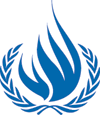|
|
 OHCHR OHCHR
The mission of the Office of
the United Nations High Commissioner for Human
Rights (OHCHR) is to protect and promote all
human rights for all.
OHCHR is guided in its work by the Charter of
the United Nations, the Universal Declaration
of Human Rights and subsequent human rights
instruments, and the 1993 Vienna Declaration
and Programme of Action. The promotion of universal
ratification and implementation of human rights
treaties is at the forefront of OHCHR activities.
OHCHR aims to ensure the practical implementation
of universally recognized human rights norms.
It is committed to strengthening the United
Nations human rights programme and providing
the United Nations treaty monitoring bodies
and special mechanisms established by the Commission
on Human Rights with the highest quality support.
The High Commissioner for Human Rights is the
official with principal responsibility for United
Nations human rights activities. OHCHR is committed
to working with other parts of the United Nations
to integrate human rights standards throughout
the work of the Organization.
OHCHR bases itself on the principle that human
rights are universal, indivisible, interdependent
and interrelated. All rights civil, cultural,
economic, political and social - should be given
equal emphasis, and promoted and protected without
any discrimination. The realization and enjoyment
of all rights for women and men must be ensured
on a basis of equality.
OHCHR is committed to promoting the realization
of the right to development and to strengthening
a rights-based approach to development.
OHCHR engages in dialogue with governments on
human rights issues with a view to enhancing
national capacities in the field of human rights
and towards improved respect for human rights;
it provides advisory services and technical
assistance when requested, and encourages governments
to pursue the development of effective national
institutions and procedures for the protection
for human rights.
A number of OHCHR field presences have been
established with a view to ensuring that international
human rights standards are progressively implemented
and realized at country level, both in law and
practice. This is to be accomplished through
the setting up or strengthening of national
human rights capacities and national human rights
institutions; the follow up to the recommendations
of human rights treaty bodies and the mechanisms
of the Commission on Human Rights and the creation
of a culture of human rights.
An essential condition for the success of field
presences is that
governments, national institutions, non-governmental
organizations, as well as the United Nations
country teams, are increasingly empowered to
take on human rights related activities on their
own, within the context of regional or sub-regional
strategies.
OHCHR seeks to play an active role in removing
obstacles and meeting challenges to the full
realization of all human rights and in preventing
the occurrence or continuation of human rights
abuses throughout the world. To achieve this
OHCHR will work closely with governments, United
Nations bodies, regional organizations, international
and non-governmental organizations and civil
society.
Concluding Observations adopted by the
CRC on violence against children in
Europe and Central Asia |
Compilation,
20 May 2005
|
PDF |
Analyses,
24 May 2005 |
PDF |
Press
releases |
|
Countering Violence against
Children: Children are not mini-human
beings with mini-human rights, 28
April 2005
|
|
Experts to explore action to
counter violence against children
4 April 2005 |
|
|

UN Photo Library
| Professional Training Series |
Human Rights and Law Enforcement: A Manual on Human Rights Training for the Police
Introduction,
chapters 1-6,
chs. 7-10,
chs. 11-15,
chs. 16-19,
chs. 20-21,
annex
International Human Rights Standards for
Law Enforcement: A Pocket Book
on Human Rights for the Police
PDF
Human Rights and Law Enforcement: A Trainer's Guide on Human Rights for the Police
PDF
Human Rights Standards and Practice
for the Police: Expanded Pocket
Book on Human Rights for the Police
PDF
The Istanbul Protocol: Manual on the Effective Investigation and Documentation of Torture and Other Cruel, Inhuman or Degrading Treatment Punishment
PDF
Manual on Human Rights for Judges, Prosecutors and Lawyers
Title
- Prelims
& addendum
- Chapter 1
- Chapter 2
- Chapter 3
- Chapter
4 - Chapter 5
- Chapter 6
- Chapter 7
- Chapter 8
- Chapter 9
- Chapter 10
- Chapter 11
- Chapter 12
Chapter 13
- Chapter 14
- Chapter
15
Training Package for Prison Officials
Human Rights and Prisons A Manual
on Human Rights Training for Prison Officials
-
PDF
Human Rights and Prisons - A Compilation of International Human Rights Instruments concerning the Administration of Justice
PDF
Human Rights and Prisons - A
Trainer’s Guide on Human Rights
Training for Prison Officials PDF
Human Rights and Prisons - A Pocket Book
of International Human Rights Standards
for Prison Officials PDF
|
| Series on human rights education |
ABC - Teaching Human Rights: Practical
activities for primary and secondary schools
Cover
- Chapter 1,
Chapter 2,
Chapter 3,
Annexes
|
| Other |
Recommended Principles and Guidelines
on Human Rights and Human Trafficking
PDF
Abolishing Slavery and its Contemporary
Forms
PDF
|
| Fact sheets |
Combating Torture
PDF
The Rights of the Child
Link
Extrajudicial, Summary or Arbitrary Executions
Link
The Committee against Torture
Link
The Working Group on Arbitrary Detention
Link
Human Rights Defenders:
Protecting the Right to Defend Human Rights
PDF
|
|